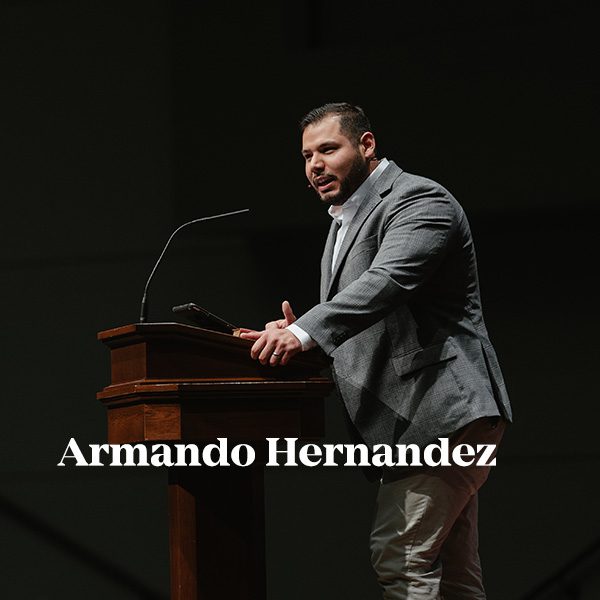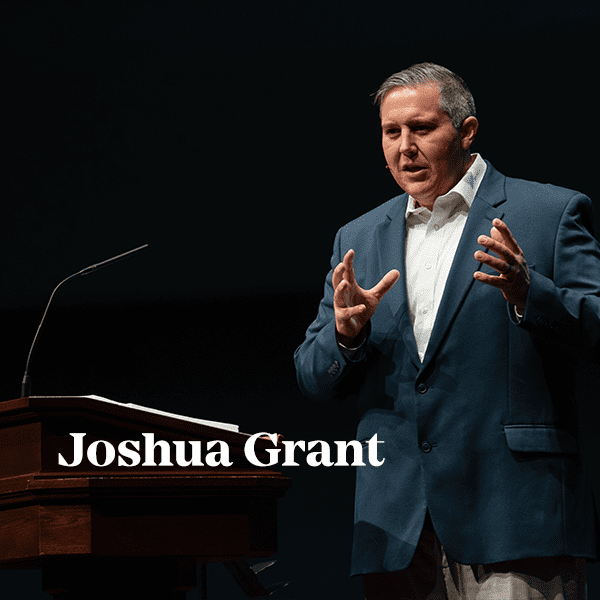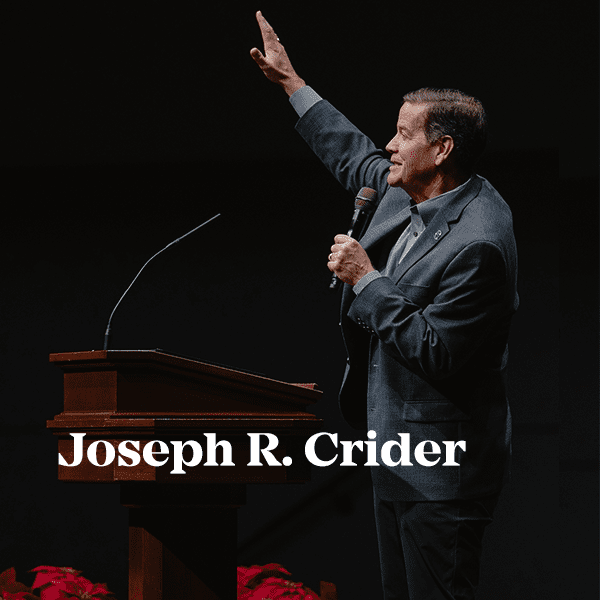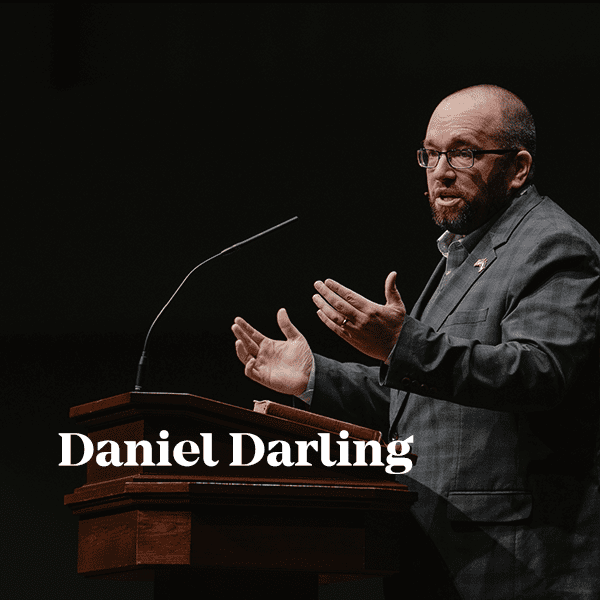Armando Hernandez, Director of Admissions and Adjunct Instructor at Southwestern Seminary, preached from Psalm 100 in SWBTS Chapel on October 29, 2024.
The following is an uncorrected transcript generated by a transcription service. Before quoting in print, please check the corresponding audio for accuracy.
Well, good morning, southwestern seminary and Texas Baptist College. Thank you, Dr. Dockery, for the beautiful introduction. It’s very humbling, and it’s very humbling to have been invited to be part of this semester’s preaching. I will admit I was very excited, not because of where I’m preaching, but because of the community that is here before me, who has been and meant so much to me over the last five years, not just for me, but also for my wife. And so, as I prepared for this sermon, I asked, I asked several of the faculty members that have preached before me if they had any advice for me, and they all kind of said the same thing, which was completely surprising to me. They all just told me, just be yourself, which is so ironic, because my whole life, people have been asking in frustration to me, why are you the way that you are? And so, I understand, much like in the Psalm we’re about to read, as in life context, is king. So, I understand what they mean. Now, speaking of kings, I’ve entitled this sermon for the king, recognize and worship.
Now, I created almost an alternate title for the TBC crowd, because we are preaching for we are speaking of Psalm 100 I’ve entitled this sermon for them authentic worship, keeping it 100 that is contextualization, which is something that the mission school can teach you all about so But in all seriousness, I have been praying and asking that the Lord would be honored and that the crumbs and scales that I bring before you would be in The hand of our Savior, spiritual food for you, and that it would encourage you. So, would you pray with me? Almighty God, you are our Creator, and we are your creation, and Lord, the chasm that exists between those two realities. Lord is humbling, But Lord, Your word, says that to all who did receive Christ, who believe in his name, you gave them the right to become children who were born not of blood nor of the will of the flesh, nor of the will of man, but of God. And so, I appeal to you this morning by Your Mercy, by the completed work of Christ and the ministry of the Holy Spirit by whom we cry Abba Father, that you speak to us today as your children, for your son’s sake.
While I was tasked with preaching a psalm that is often called the old 100 upon forced glance into my honest chagrin. I was somewhat disappointed. It seemed to me like this passage was so straightforward and felt like I could just read it and say that, at first glance, there seems to be no controversies to unpack. It presents no theological dilemmas that test our faith, nor sharp rebukes that cut in order to bring healing, and no bitter truths that might ease the gut-wrenching pain of hardship. Instead, it offers a message that elicits almost an instant yes and amen, but that is only at first glance, because you see God in His wisdom, offers this Psalm as a discourse that requires patient and quiet meditation and contemplation of each word and phrase. Only then will you and I appreciate what God is saying about who he is in light of this psalm, see, this psalm is the culmination of a set of kingly Psalms, from Psalm 93 to Psalm 100 all sharing one common theme, the worship of God as king. It is believed as Dr McKellar so eloquently illustrated for us last week that this these psalms were used as a hymnal for the celebration of this Feast of Booths. And upon closer inspection, we see that each of these eight Psalms is grouped in pairs, all that share a common variation of the King worship motif.
See chapters 93 and 94 remind us to worship the King who rules and judges all the earth. 95 and 96 affirm and warn us that Yahweh is the only God to be feared. 9798 with increasing emphasis, tell us that our King is the one who brings salvation to his people. And Psalm 99 begins to tell us about the character of his God and King with an expectation from us to respond. Let them praise your great and awesome name, holy, is he? And then Psalm 100 which tells us, well, why don’t we look at it together? If you have your Bible, Psalm 100 it says. Let the whole earth shout triumphantly to the Lord. Serve the Lord with gladness. Come before him with joyful song, acknowledge that the Lord is God. He made us, and we are His, his people, the sheep of his pastures, Enter his gates with thanksgiving and his courts with praise. Give thanks to him and bless his name, for the Lord is good and His faithful love endures forever, his faithfulness through all generation.
See this psalm culminates the kingly hymnal, a psalm composed of two basic parts. The first is what I call the command to worship. It is composed of two basic parts. The first one is a command to worship, and the second one is an explanation as to why this God is worthy of that worship. Now you should be no stranger to this. The Bible is replete with these. In fact, the Psalm is probably the most common place where you will find these. For instance, Psalm 95 tells us, oh, come. Let us sing to the Lord. Let us make a joyful noise to the rock of our salvation. For the Lord is a great God and great King above all gods. Exodus 15 tells us, Sing to the Lord, for He has triumphant, gloriously, the whores in his rider He has thrown into the sea, or revelations 19, who tells us praise our God, all you His servants, you who fear Him, small and great for the Lord our God, the Almighty reigns. That is the command to worship.
The second is what is commonly known in in the Bible as a recognition formula I’ve I just call it a command to recognize which is also composed of two parts. Is the first is a declaration of God intervening in history in a miraculous, powerful way, and the second is his intention to be recognized as the only sovereign, powerful and Almighty God through that act. Examples of these is Ezekiel, chapter six, the slain shall fall in your midst, and you shall know that I am the Lord or Exodus 14, I will harden Pharaoh’s heart and He will pursue them, but I will gain glory for myself through the Pharaoh and all his army and the Egyptians will know that I am the Lord. See, these are the two components of this psalm, recognize and worship. So now let’s read the first three verses together and see if we can unpack these. Let the whole earth shout triumphantly to the Lord.
Serve the Lord with gladness. Come before him with joyful song. Acknowledge that the Lord is God. He made us, and we are His, his people, the sheep of His pasture, see the psalmist come up, commands us to worship, saying, shout triumphantly, acclaim the Lord, make a joyful noise. This command has the imagery of a conquering king taking his rightful throne, and his people watching him as he takes the steps into his rightly throne, and all the people chant and yell announcing the conquering king has arrived. And everyone just joyfully shouting to the Lord, long live the Lord, our God. Yahweh, serve the Lord, says the psalmist, this is a special command that is anchored in the imagery of God’s redemptive work, particularly for Israel in the Exodus.
You see, God’s plan was always to redeem Israel from the oppression of Egypt. And as Israel cried, God hears the cry and commands Moses tell Pharaoh. Thus says the Lord, Israel is my first-born son, and I say to you, let my son go that he may serve me. This is the story of the old 100 This is what Israel is thinking of. But the Pharaoh refuses. He hardens his heart, and God’s almighty hand falls upon Egypt over and over again, plague after plague, God shows his power and his determination to rescue his son out of the oppression of Egypt. Let my people go that they may serve me. Now, one can imagine the thundering voice of God upon Moses’ ears as he instructs him to tell Pharaoh one more time to obey. But it was not until the last plague that Pharaoh momentarily acquiesces. But he changes his mind, and he chases Israel all through the land until they arrive at the Red Sea, which God. By the Almighty God through Moses’s instruments parts before Israel, and when all the Israelite has crossed, the waters fall upon the army of Egypt.
And so, Israel reminded of this great act, can only respond with worship. Worship this king all the earth make a joyful noise the God who took us out of Egypt to serve Him, and let’s do so with gladness. Now, although this psalm seems to take place on the way to the temple gates, the goal is not to arrive at a physical place, but to arrive at his presence. Look at what the next part says. This is our God who not only rescues you but calls you to serve him. He invites you into His presence. This Holy, holy, other Creator God invites us to draw near, to come into His presence, the creation, summoned to the presence of his Creator. Come with joyful singing. We can be thankful today that we are summoned unto and accepted into His presence by HIS WILL alone. And these first two verses, we have three imperatives, the first part of what we have, what we have called the command to worship. But look at the first the fourth imperative, it says, acknowledge or know that the Lord, He is God. Why is this so? Because although this starts as a command to worship, the primary emphasis that the psalmist wants us not to miss is that we are commanded to recognize this god.
It’s actually a command to recognize see. It starts as a command to worship, but it turns into a command to recognize the goal. The emphasis of verse one and two is not primarily that we are to respond to these commands, but that the only reason why we can make a joyful noise, the only reason that we can worship His name and serve him and come into His presence. Presence is because of his act of power displayed in the historical redemptive story of the Exodus and for the New Testament children of God in Christ, Jesus, the cross and the empty tomb. You know, we’re all Baptists here. We all have commonly heard the question, how did you come to know the Lord?
Now, oftentimes people respond, well, you know, I went to church and, you know, said the ABCs, accept, believe, confess, but that’s not what we ask. That’s not really what we want to know. I mean, if you’re a pastor here, you probably say, well, tell me more about this God that you know. See. What we want to hear is how this God intervened in their life in a mighty way, how he changed his heart, or her heart of stone, and gave them a heart of flesh. What we want to know is, do you know this God that we proclaim. Do you know this God that commands us to worship him? When was the last time that you were in church and thought, how in the world did I get here now I don’t mean my roommate drove me. I mean, when you think about your story of redemption, when you think about how the Lord rescued you see, I had the privilege of being saved at the age of 24 and I can tell you, my whole testimony was replete with pain, suffering, being involved in sin. And can I be quite honest, liking my sin. But then God intervenes. He takes my heart, makes me feel and realize that the way I was leaving is completely opposed to him. And all of a sudden, I start to feel disgust for my sin. And then he summons me; tells me your sin will have no place before me. And then he shows me a man on a cross that says, I’ll take that sin, I’ll die for that sin. And so that message of hope changed my life. I put my trust in Christ completely, and my life has been changed ever since. See Can I be honest with you?
My biggest fear is that my son will come to know the Lord at such a young age that he will never experience God the way I did. And it’s an incorrectly placed fear, because what this psalm reminds me is that this Psalm was put here in the Bible to remind all the generations of Israel that would come about his great act in the Exodus. Maybe the first generation experienced it. Maybe perhaps the second generation, but the third, the fourth, the fifth, and yet what the psalmist calls us to do is worship Him. Remember this great act, remember this incredible moment in which God, in His mercy, removed you from the oppression of Egypt, and God, with his word, just by His grace, reminded me, it’s not your experience, at least not alone. It’s Christ on the cross, and I pray that my son knows him at your early age and loves him throughout his whole life. Now the next part has four statements.
In verse three, he made us. We are His, his people, the sheep of His pasture. Now these four statements are so theologically packed that whole years can be devoted to each of these doctrines for your profit. So if you ever need a practical reason to study systematic theology, here it is. You will understand this psalm better. Look at what it says. He says he made us. That’s the doctrine of creation. The king created the world and the dust in it, and then created from that dust, Adam man. We are His. That’s the doctrine of man, or theological anthropology, God who reigns over all humanity through all time, we are His people. This is the doctrine of election, no matter where you stand. Theologically in it, you can revel knowing that this Sovereign King chooses to say about those who are not my people, I will call my people, and those who are not my beloved, I will call Beloved. And then the next one the sheep of his pastures.
Any guesses? What doctrine is that the King who made us, who chose us, also cares, protects and guides us, the doctrine of God’s providence, who should bring to all of us a reassurance of the beauty and love of our great king. The point is that the king must be recognized. The singer of this psalm introduces themselves for the first time only in relation to God, because this is all about God. Who are you? Paul would say, I am a servant of God Almighty. How would Peter introduce himself? Peter, a servant of an apostle of Christ, Jesus. How is this psalmist introducing himself? We are His people, the sheep of His pasture. This whole Psalm is about God, 15 references to God Himself, four of those using the covenantal name, Yahweh. Shout to the Lord. Serve the Lord. Come before Him. The Lord is God. He made us. We are his his people, his pasture, his gates, his courts. Thanks to him, bless his name, the Lord is good, his faithful love, His faithfulness. It’s all about him. And so should your life.
Every class you take, every job you apply, for your boyfriend, your girlfriend, if they’re not helping you make your life about God, you’re in the wrong place. Now, if you’re married, if you’re not helping make your wife or your husband, this life all about God, repent. You know, when I moved to Fort Worth, I left an incredible ministry down in the border of Brownsville, Texas. And you know, I trusted God. He said, move to Fort Worth. I said, okay, and by God’s grace, I found a job in a retail shop. And if I’m honest, I was a little upset. I thought, Lord, I left such a great opportunity, and I’m here at this retail shop. This is what I used to do in college. But, you know, it was, must have been the first week I committed I’m going to serve the Lord wherever he has he has me because he does not make mistakes, and I trust that he has put me in a place for His glory. So, I began to work at contentment, and for a year and a half, I served the Lord in that job, and I did so with gladness. The Lord gave me a ton of opportunity to witness to people that would come and to customers and to build a relationship with my manager.
And so, we had so many conversations about the Lord, and it was such a great time. Now fast forward, I don’t know, two years. I’m working here at Southwestern, and I must have been leaving the chapel, and a pastor from this from this area, who’s also a student here, approaches me, and he says to me, Armando, do you know such and such? And I said, yeah, yeah. He’s, he was my manager back in when I was working at the retail shop. And he said, you know he’s been talking about he’s been coming to my church. And he says, he knows you because, you know I told him I go to school here. But I gotta tell you, he’s, he’s been sharing with us all the things that you’ve like told them concerning the Lord. And I just want you to know that him and his wife are going to get baptized this coming week. It’s all about him. Now, could God have given me another job?
Yeah, at a church, yeah. But God had a plan, and he sent me to fulfill that plan. And if I would have been stuck angry because I was in a place that I think I was overqualified for, where would that family be? I don’t know. The point is this, the Lord is King, and we are wholly dependent on him, and he has chosen to provide for us and to sustain us, and so we must recognize and worship. Now I mentioned that two parts of that this psalm is composed of two parts, we have we have covered the command to recognize. Now listen to the command to worship. Enter his gates with thanksgiving and his courts with praise, give thanks to Him and bless his name, for the Lord is good and his faithful love endures forever. His faithfulness through all generations.
Once we recognize who God is and what we what he has done, we can approach his gates with thanksgiving, Thanksgiving as a response to his great acts, we praise and bless his name, always knowing that he is worthy, that he has shown his mercy to you and that he has lavished His grace upon you and saved you by His grace. Verse five says, For the Lord is good. It is his very being and character he cannot change, and he cannot keep from being good, which is why his covenantal commitment, his faithful love, is not limited to the past or even to the present, but look at what it says. It endures forever. And his faithfulness not limited to the people of old, but to everyone through all generations, because He is God and He is good, and he cannot and will not stop being God because He is King, recognize and worship. You know, these past few weeks, I’ve been reading John in my devotional, and as I was studying for this message, as I was reading John 19, I couldn’t help but to think that that Israel, you know, really blew it.
They had the Psalms, presumably, they sang it year after year, and yet they failed to recognize the Messiah as king. In fact, if you, if you read John 19, it’s the story of God of Jesus being handed over to the authorities and him being crucified. And when this Psalm says, shout and worship the King, what did they do away with him? Crucify Him. When this Psalm tells us worship the King, what did Israel say? We have no king but Caesar. They didn’t enter into His presence with gladness. In fact, they approached him with a crown of thorns and flogged him and spat in his face and slapped him they did not recognize the Lord. Christ is God and King. Romans, 14 says, for we will stand before the judgment scene of God. For it is written as I live, says the Lord, every knee shall bow to me and every tongue shall confess to God. And. You that Jesus is Lord, the great act is the cross, that while we were yet sinners, Christ died for you. And if you have not given your life to this great king, do it today. It’s a gift that you can take today by repenting and believing that He is worthy to be recognized, that he is worthy to be known as the only God that exists, the Almighty Yahweh.
Only then can you recognize and worship him. You know, we have this koi pound here in southwestern and I was walking one night because one of those cool nights that we just had for like a second, and I was really drawn by the beauty of it. So, whoever takes care of it, thank you for your ministry, it has really been just a blessing to me, as you, you know, make that place look so beautiful. And I was just kind of pondering on this Psalm and pondering on my life and everything that it entails in relation to God. And I kind of started looking at this, this tree that, for some reason it was just beautiful. And I was looking at the details of it, which is not something I’m not like a green guy so, but the bark and the it just all was just so mesmerizing. And I must have spent five or seven minutes looking at it, just pondering. But then I realized that what I was looking at was not a tree. It was the reflection on the pond of a tree. Listen, your worship of God is beautiful when you’re accurate, accurately reflect the Christ who is let’s pray, Father. I thank you for your word. I thank you for your beauty. I thank You Lord that you intervened in our lives, and Lord, we pray that you do that in so many other lives, that you use us as your instruments, that the whole earth may worship you as king. We trust you and we trust your word in Jesus, name I pray. Amen.







